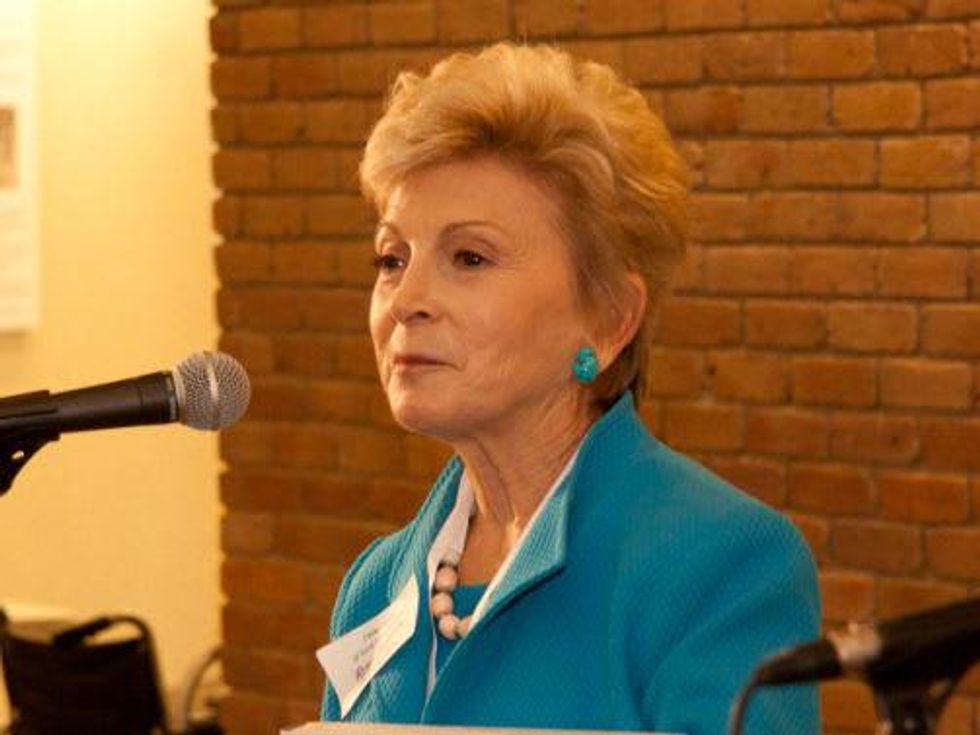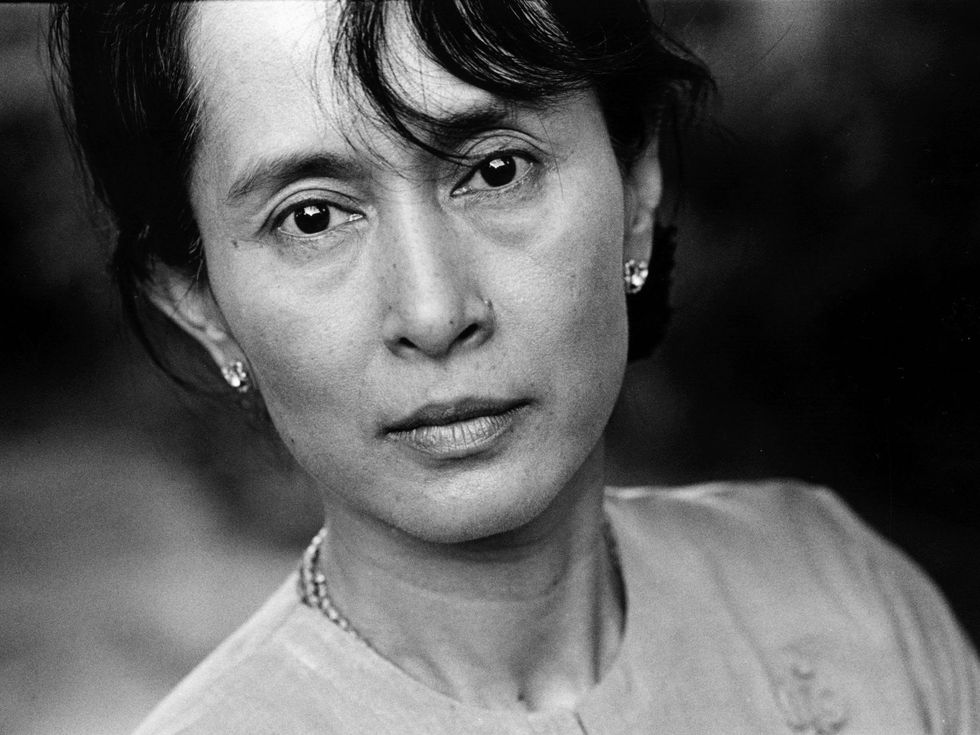TEDxSMU Teasers
TEDxSMU speaker Rena Pederson wants the whole world to know Aung San Suu Kyi
Chances are, even if you've heard of Noble Peace Prize winner Aung San Suu Kyi, you probably don't know to pronounce her name. But Rena Pederson is on a mission to change that.
"Think of Unsung Hero — Aung San — then Suu, and Kyi, which is pronounced like Chee in Cheeto," Pederson says. "When she was awarded the Congressional Medal of Honor, half the house leaders mispronounced her name, and so did the president. I could have died. I wish I could have given him my secret guide."
Pederson is award-winning journalist who spent more than 30 years at the Dallas Morning News before becoming a speech writer for the U.S. Department of State. She's traveled to Burma eight times and met with Suu Kyi twice. Currently, Pederson is working on a book titled The Burma Chronicles: Aung San Suu Kyi and the Struggle for the Soul of Burma.
"She is the most impressive human being I have ever met in my life," Pederson says of Kyi. "If she walked in the room, you would feel her."
Suu Kyi spent about 20 years under house arrest and is now a member of Parliament with hopes of running for president in 2015, when she will be 70 years old. "2015 will be a hinge moment," Pederson says. "She’s devoted most of her adult life to fighting for democracy. And the question is will she get to lead her country to better days? "
Pederson will share her experiences in Burma with the TEDxSMU crowd on October 19. She recently sat down to chat with us about Aung San Suu Kyi and her illustrious career in journalism.
CultureMap Dallas: When did you first become interested in Aung San Suu Kyi?
Rena Pederson: In 1991, Aung San Suu Kyi won the Nobel Peace Prize. I was fascinated by the description in the New York Times that she’d gone to Oxford, spoke four languages fluently, and was now locked up in her house for trying to bring democracy to Burma.
She couldn’t see her husband or her children, who were back in England. She mediated and exercised and played the piano for hours to bang out her frustration. I followed her for the next decade, and I thought, "What makes this woman tick?"
CM: How did you eventually get to interview her?
RP: It was one of the last projects I did for the Dallas Morning News. In 2003, I got smuggled in to see her. I can’t really tell you anymore than that because it involved a diplomatic person. It was my own little private adventure.
After I left, she was released briefly and then again put under house arrest with even harsher conditions. I was the last person allowed to interview her for seven years.
CM: What is she like?
RP: She is the most impressive human being I have ever met in my life. If she walked in the room, you would feel her. You would look up and say, "What was that?"
She has this incredible presence of character, principles and just this aura of strength.
CM: How does someone stay that resilient in the face of so much opposition?
RP: That’s what’s so intriguing about her. I think to understand Aung San Suu Kyi, you have to know her family tree. Her father was the George Washington of Burma.
"The protests in Burma were much more violent and bloody than the famous Tiananmen Square demonstrations, but most people don’t even know it happened," Pederson says.
He was a war hero, and he fought to get Burma independent from British rule. He was just forming the first democratic government in Burma after WWII when he was assassinated. Aung San Suu Kyi was only 2 years old.
Her mother also was this remarkable person. She was a wartime nurse who was an advocate for women and children. She went on to become the ambassador to India and a national figure in her own rite.
Aung San Suu Kyi grew up part of the time in India and went to school with the Ghandi children. Her genes, her upbringing and her Buddhist faith have given her a remarkable sense of strength and compassion.
CM: How did Kyi end up under house arrest?
RP: She was working on her doctorate and living in England with her husband and two children when her mother had a stroke. Suu Kyi packed her bags and took the next flight to Burma.
Just as she arrived, Burma was having widespread student-led demonstrations against the military party. It was August 8, 1988 — the year before the famous Tiananmen Square protest. The ones in Burma were much more violent and bloody, but most people don’t even know it happened because Burma is so much more isolated than China.
Protestors came to Aung San Suu Kyi in the hospital and they said, “You must help us. You are your father’s daughter. You need to take up his dream for freedom. We can’t do it alone.”
She started campaigning all over the country, and of course her life was threatened. But her party came out of nowhere and won the election for democracy. The military party locked up most of her party leaders and put her under house arrest. They couldn’t put her in prison because her father was so revered.
CM: What was the most memorable part about meeting Kyi in person?
RP: I still remember as we drove away from her compound, there she was standing on the steps of her house by herself, and then the gate closed. And I thought, I can leave and go, and she’s still in that house.
CM: What’s the biggest difference in media today versus 30 years ago, when your journalism career started?
RP: There are so many more sources of information. I’m still a devoted newspaper reader, but I am also online a lot of the time.
CM: Describe your perfect day.
RP: Being with my grandchildren. I love to see a child look at a flower and marvel. When I visit my grandchildren, I call it "going marveling." My second-place day would be anyplace in Italy or Provence.
CM: Did you always know you wanted to be a journalist?
RP: I actually did. I had my own little newspaper in grade school. I'd type out bulletins about my cat, Fluff.
CM: What are your words to live by?
RP: I believe in the Physican's Creed, "Do no harm." It's a good way to work as a journalist and just as a human being. It's almost a Buddhist idea too.
CM: What do you hope TEDxSMU attendees learn from your talk?
RP: I hope they come away with a new appreciation for the struggle for democracy in Burma and a new appreciation for what a remarkable, historical figure Aung San Suu Kyi is.
So many people know a lot about Nelson Mandela, or the Dali Lama, who also have won the Nobel Prize. But not a lot of people know about her.
---
TEDxSMU is officially sold out, but the entire program will be live streamed on October 19, 9 am-6 pm.


